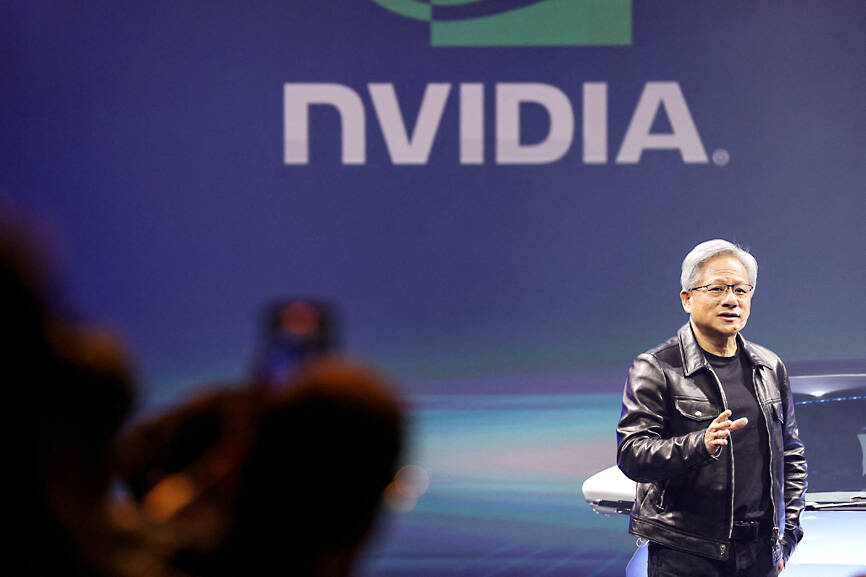US giant Nvidia Corp, the world’s most valuable chipmaker, is selling a less-capable version of its best graphics product for video gamers in China, after Washington tightened restrictions on what the company can market in that country.
The version of the GTX 4090 D chip that is listed for sale on Nvidia’s China Web site has about 10 percent fewer processing cores than the 4090 that is sold in other countries.
“The GeForce RTX 4090 D has been designed to comply with US government export controls and will only be available at retail in China,” a Nvidia spokesperson said in an e-mail.

Photo: I-Hwa Cheng, AFP
The company’s chief executive officer Jensen Huang (黃仁勳) has said he would produce versions of his market-leading products for China that comply with rules imposed by the administration of US President Joe Biden on exports to that country.
The US, seeking to slow down the advancement of China’s artificial intelligence (AI) capabilities, is limiting access to specialized chips in that market.
The company said it “extensively engaged” with the US government while developing the graphics product, which is to be available next month.
Compared with the 4090 sold elsewhere, the China model will also have fewer processing subunits that are useful for accelerating AI workloads, Nvidia said.
US officials, who have cited national security concerns, are more interested in Nvidia’s AI accelerators, a range that is currently topped by the H100. That type of chip, which is based on technology used in graphics cards, has become the basis of an explosion in AI-capable hardware by owners of large data centers.
When US export rules were tightened last year, Nvidia introduced less capable versions of its chips for China. The US clamped down again in October by further reducing performance thresholds. Nvidia’s leadership responded by saying the company would again redo its offerings for the Asian country, the largest market for chips, to make them compliant with the new rules.
Nvidia shares rose less than 1 percent to US$497.10 at 12:25pm local time in New York. The stock has more than tripled this year, making Nvidia by far the best-performing semiconductor stock this year and the industry’s first company with a market value of US$1 trillion.

BYPASSING CHINA TARIFFS: In the first five months of this year, Foxconn sent US$4.4bn of iPhones to the US from India, compared with US$3.7bn in the whole of last year Nearly all the iPhones exported by Foxconn Technology Group (富士康科技集團) from India went to the US between March and last month, customs data showed, far above last year’s average of 50 percent and a clear sign of Apple Inc’s efforts to bypass high US tariffs imposed on China. The numbers, being reported by Reuters for the first time, show that Apple has realigned its India exports to almost exclusively serve the US market, when previously the devices were more widely distributed to nations including the Netherlands and the Czech Republic. During March to last month, Foxconn, known as Hon Hai Precision Industry

Taiwan Semiconductor Manufacturing Co (TSMC, 台積電) and the University of Tokyo (UTokyo) yesterday announced the launch of the TSMC-UTokyo Lab to promote advanced semiconductor research, education and talent development. The lab is TSMC’s first laboratory collaboration with a university outside Taiwan, the company said in a statement. The lab would leverage “the extensive knowledge, experience, and creativity” of both institutions, the company said. It is located in the Asano Section of UTokyo’s Hongo, Tokyo, campus and would be managed by UTokyo faculty, guided by directors from UTokyo and TSMC, the company said. TSMC began working with UTokyo in 2019, resulting in 21 research projects,

Ashton Hall’s morning routine involves dunking his head in iced Saratoga Spring Water. For the company that sells the bottled water — Hall’s brand of choice for drinking, brushing his teeth and submerging himself — that is fantastic news. “We’re so thankful to this incredible fitness influencer called Ashton Hall,” Saratoga owner Primo Brands Corp’s CEO Robbert Rietbroek said on an earnings call after Hall’s morning routine video went viral. “He really helped put our brand on the map.” Primo Brands, which was not affiliated with Hall when he made his video, is among the increasing number of companies benefiting from influencer

Quanta Computer Inc (廣達) chairman Barry Lam (林百里) yesterday expressed a downbeat view about the prospects of humanoid robots, given high manufacturing costs and a lack of target customers. Despite rising demand and high expectations for humanoid robots, high research-and-development costs and uncertain profitability remain major concerns, Lam told reporters following the company’s annual shareholders’ meeting in Taoyuan. “Since it seems a bit unworthy to use such high-cost robots to do household chores, I believe robots designed for specific purposes would be more valuable and present a better business opportunity,” Lam said Instead of investing in humanoid robots, Quanta has opted to invest